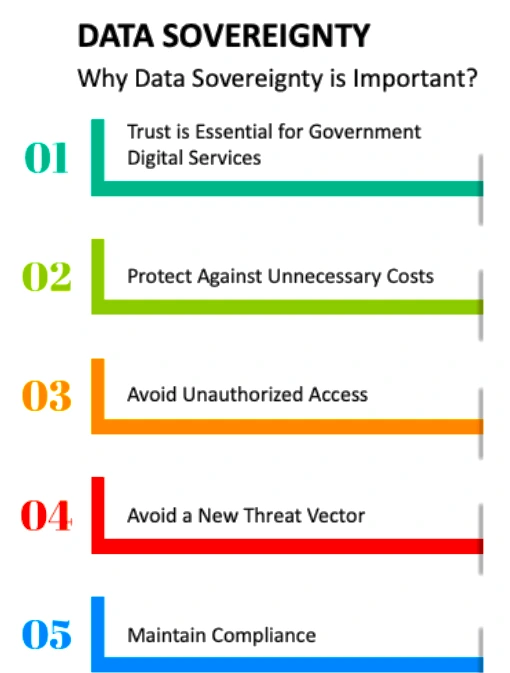Context: With the future development and applications of Artificial Intelligence (AI), the principle of territorial sovereignty is being transformed into that of digital Sovereignty.
| Relevancy for Prelims: Artificial Intelligence (AI), Global Data Governance, Global Partnership On Artificial Intelligence – GPAI, National Digital Communications Policy 2019, and Digital Personal Data Protection Act, 2023.
Relevancy for Mains: Digital Sovereignty, Rising Significance, India’s Vision, Challenges, Steps Taken, and Way Forward. |
About Digital Sovereignty
-
Meaning of Sovereignty
- Sovereignty means that the state is the supreme and exclusive authority in a territory and it is subject to no internal competitors or no unwanted external influence.
-
Definition of Digital Sovereignty
- Although there is no universal definition, digital sovereignty is an umbrella term that refers to the ability to exercise control over digital assets, such as data, content or digital infrastructure, or over the use of those assets.
- Digital sovereignty is often used to describe an ordered, value-driven, regulated, reasonable and secure digital sphere.
- It is presumed to resolve the multifaceted problems of individual rights and freedoms, collective and infrastructural security, political and legal enforceability and fair economic competition.

Reasons for Rising Significance of Digital Sovereignty
- Rising Digitalisation: It is a major driver in shaping economics, politics, and the balance of power in global affairs.
- As per the market estimates, the global digital transformation market size is anticipated to reach around USD 1000 billion by 2025 from around USD 470 billion in 2020.
- Rise of Corporate Governance: Transborder and multi-level governance of AI is at the very heart of corporate governance, and sovereignty over peoples and nations is being transformed into masses of accumulated classified data.
- Global Data Governance: It is contested by nations and industry players seeking to shape the rules of the road to benefit their strategic interests.
- India has placed itself at the heart of the battle with its foreign policy vision fuelled by the principle of ‘data sovereignty’, a broad notion that supports the assertion of sovereign writ over data generated by citizens within a country’s physical boundaries.
- Contest Over Digital Sovereignty: Over the last decade, digital sovereignty has become a central element in policy discourses on digital issues, popular in both authoritarian and democratic countries alike.
- Rise in Digital Economy: India desires to claim more of the economic benefits of cyberspace, in the growing digital economy. In this emerging landscape, digital sovereignty is about how a state regulates and exercises control over the technology and services in use there.
- For instance, cloud services are becoming increasingly important to be able to use, transfer and store data. However, data stored in cloud computing services may be under the jurisdiction of more than one country’s laws which may make an organization’s compliance even more difficult when there are multiple domestic data privacy statutes to juggle across the countries.
-
Other Reasons for Rising Significance of Digital Sovereignty
-
- Concerns about state surveillance (rising from the 2013 Snowden Revelations).
- Concerns over the level of dependence on extranational infrastructure and systems.
- Concerns over online harms.
Snowden Revelations
- The scandal broke in 2013 when a newspaper reported that the US National Security Agency (NSA) was collecting the telephone records of tens of millions of Americans.
- Ex-CIA systems analyst Edward Snowden was behind the leaks about the US and UK surveillance programmes.
- The paper published the secret court order directing telecommunications company Verizon to hand over all its telephone data to the NSA continuously.
- That report was followed by revelations that the NSA tapped directly into the servers of nine internet firms, including Facebook, Google, Microsoft and Yahoo, to track online communication in a surveillance programme known as Prism.
- Britain’s electronic eavesdropping agency Government Communications Headquarters (GCHQ) was also accused of gathering information on online companies via Prism.
|
India and Digital Sovereignty
- India’s digital sovereignty vision has three pillars:
- A push to leverage data as a key tool of economic growth and development by asserting regulatory oversight over the practices of multinational private actors.
- A domestic push backed by a global diplomatic course of action to prevent the inequitable construction of digital trade rules.
- The leveraging of data security in bilateral security disputes.
- Global Data Governance: Through multilateral diplomacy at the World Trade Organization (WTO) and other forums, India has placed itself at the centre stage of the global battle on data governance.
- India has taken strong positions in WTO debates, including asserting that any rule-making on data governance outside the consensus-driven model of the WTO will dilute the voices of emerging economies and suppress their sovereign right to frame rules that further their citizens’ best interests.
- A key pillar of foreign policy vision in this domain is the principle of data sovereignty, which supports the assertion of sovereign writ over data generated by citizens within a country’s physical boundaries.
Challenges Associated with Digital Sovereignty
-
Ideological Confrontations
- The world is split into two ideological camps for crafting norms of the digital world for the global community.
- The first led by the US, which believes in unrestricted data flow, takes a laissez-faire approach to government intervention and protection of international human rights online with multistakeholder feedback.
- The other is championed by the Russian and Chinese philosophy of information sovereignty which allows states to define their network frontiers and regulate them as they see fit, bearing their sovereign interests in mind.
-
Data Colonialism
- The extractive economic practices of Western technology companies seeking to consolidate their market power at the expense of individual users in the developing world, who are, the creators of this data.
- India does not sign the Osaka declaration on cross-border data flow, the initiative seeks to standardize rules in the global movement of data with better protection for personal information and intellectual property.
-
Against Free and Open Internet
-
- Concern with the ideal of data sovereignty and global attempts to leverage it has come under heavy criticism from various stakeholders as the concept violates the free and open Internet principle.
- Critics argue that data sovereignty hampers innovation and economic growth, and is a ruse for authoritarian digital governance.
-
Security of National Infrastructures
-
- There is an erosion of trust among public institutions due to the lack of understanding of rapidly changing technology among legislators, public servants, and the general public. Further, there is a growing mistrust of technology from certain countries
- For instance, the countries of the Five Eyes intelligence alliance (United States, Australia, Canada, New Zealand, and the United Kingdom) have banned or are rolling out bans of Huawei, viewing it as a potential threat to security.
Steps Taken By India For the Digital Sovereignty
- National Digital Communications Policy 2019: Major official document referring explicitly to the notion of digital sovereignty. Along with strategic goals for the development of the information and communications technology (ICT) sector, which proposes adopting data protection and cybersecurity measures.
- New Information Technology (Intermediary Guidelines) Rules 2021: Intermediary Guidelines Rules with more stringent content moderation rules for online platforms, making numerous references to the protection of India’s sovereignty and integrity.
- Digital Personal Data Protection Act, 2023: To replace India’s existing Information Technology Act of 2000 and provide comprehensive oversight of the digital landscape. It seeks to address modern challenges like cybercrime, data protection, deepfakes and online safety.
Way Forward to the Digital Sovereignty
- Ideological Mediation: Nations across the globe have differing interpretations of digital sovereignty, with the third way which appropriately regulating multinational companies to further public interest while still championing civil liberties online and cross-border data flows with minimal restrictions.
- India has been regarded as a crucial digital decider in this space, and its diplomacy will likely define this regime for years to come.
- Further, the European Union is perhaps shifting away from the US camp towards a third way.
- New Coalitions: India should also look to build new coalitions related to the storage of data.
- For instance, the Quadrilateral Security Dialogue provides an interesting prospect as Australia has already invested AU$500,000 to support the development of a Quad Tech Network that focuses on cybersecurity and sensitive technology issues, including AI.
- Global AI Regulation: In 2020, India became a founding member of Global Partnership on Artificial Intelligence, a coalition set up to chart out rules of the road for the governance of artificial intelligence (AI).
- It comprises all G7 member countries, South Korea, Singapore, Slovenia, and the EU.
- Adopting a Flexible Approach: India need not to follow an ‘all or nothing’ deal that forces it to adopt consensus-based rule-making on all issues of digital trade. Instead, India should push for the modular approach adopted by the Digital Economy Partnership Agreement (DEPA) between Singapore, Chile and New Zealand.
-
- DEPA members can decide on an assortment of modules they want to comply with. Such an arrangement could push towards the creation of a global legal architecture that is enforced incrementally.
- Promoting Alternative Indian Platforms like:
- Koo: Koo is an Indian microblogging and social networking platform launched with a focus on Indian languages and a government-friendly stance, as an alternative to X (formerly known as Twitter).
- BharatOS: A mobile operating system to challenge Google whose Android operating system (OS) dominates the country’s smartphone market.
- Open Network for Digital Commerce (ONDC): It displays products and services from member e-commerce platforms, and is touted as an alternative to Amazon and Walmart.
Must Read: Global AI Summit London 2023 – Global Governance of Artificial Intelligence
![]() 5 Jan 2024
5 Jan 2024


